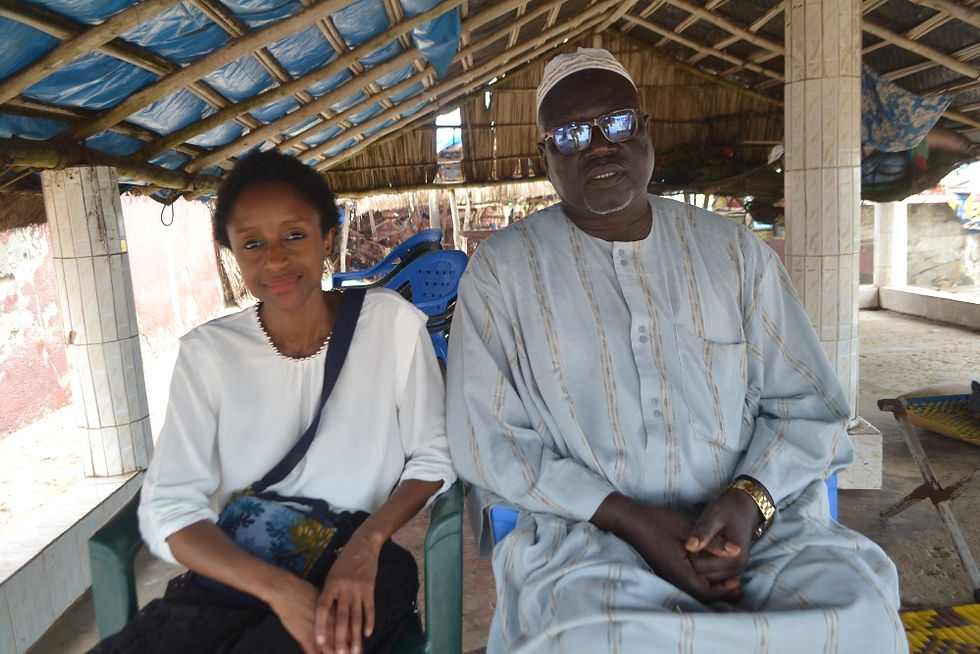Géej gi - The Old Man and the Sea
- Fatoumata Ngom
- Apr 16, 2024
- 4 min read
"The Old Man and the Sea", because that day, listening to the old man, the fishermen and the children, and imagining them out at sea facing the waves, I felt that the spirit of Hemingway, Santiago and little Manolin was with us. This is the story of human dignity and courage. It's a story of courageous fishermen, of children who learn from their elders, and of women who share the same condition. Universal literature and organic creation can thus serve public policy.
The day after the event at Mboro High School, I went to meet the fishermen with my friend Ndiaga Ndiaye, leader in Mboro. Administratively, following the redrawing of the administrative boundaries in 2013 by the Senegalese government, Mboro-sur-mer now belongs to the Commune of Darou Khoudoss. This is one of the most questionable aspects of this division. It denatures Mboro and deprives it of a considerable tax base. Additionally, it creates confusion. At Mboro-sur-mer, they simply say "Mboro".
Once I left ICS Mbaye-Mbaye City, there was a lot of emotion on the way. I felt particularly emotional as I passed the Dabo family shop and the Niayes pharmacy.
We made a diversion towards the "sunless street”, very shady because of a row of trees whose leaves touch each other on either side of the street.
Then it's off to the sea.
On the road, I noticed that my phone was gradually losing network. On the screen, 4G changes to 3G, then Edge, then nothing. This is problematic because Dread Maxim, who had spent the night at the beach, and I were had to meet up for the project. We won't be seeing each other. It was impossible to make a call, let alone use the Internet. Connectivity to the mobile network is a real problem in this area and the fishermen complained about it during the discussions.
When I arrived, I was immediately surprised by the welcome I received. The men of the sea came in huge numbers. They were already settled in a large open hut. I was greeted by their leader, Khouna Niang, an old man who had travelled all the way from Saint-Louis for this meeting, leaving at 4am to get to Mboro on time. It's a huge honour.
We're facing the Atlantic Ocean. There are lots of children. A mischievous little boy winks at me, and I smile back at him tenderly.

The video equipment is set up. There's a bit of backlighting, but it's not okay. The most important thing is the content of the exchanges and the memories we'll have of them.
The discussions begin. After the customary greetings, the village religious dignitary in the audience led a moment of prayer.
One fisherman followed another and their speeches were edifying. They share a lot of information with me, they know they can trust me. I feel confident too.
We speak Wolof and it's a real therapy to speak Wolof for so long. I realise that I really miss speaking Wolof.
At Mboro-sur-mer, the Atlantic Ocean abounds with all kinds of resources and fishing treasures. But these resources are dangerously threatened by environmental degradation. Unfair fishing practices by large boats authorized under international cooperation agreements also pose a threat. Additionally, the lack of health and transport infrastructure, fishing wharves, high population density, and poverty further endanger local development and broader wellbeing. The beach at Mboro and other neighbouring communes serve as a receptacle for human waste and industrial pollution from companies like ICS. This damages human health, biodiversity, and wildlife. It also undermines the financial income of marine villagers. The big boat from Europe has become an entity. In the imaginary of this fishing village, this big boat with its disproportionate size and means is a state-authorised racketeer. Like a ghost, it haunts their spirits and feeds deep disillusionment. These human souls, their pirogues and their rudimentary nets are so small compared to the big boat.
"Yesterday, a boat confiscated a net. The fisherman had to borrow money to buy oil for his pirogue to go to sea” - A fisherman
There was one thing that immediately caught my attention: there were no women in the audience. Nor were there any little girls or young women, although there were plenty of boys. Eternal invisible ants?
At one point during the discussions, I asked why the women weren't there, and if I could hear them too. The dignitaries then called a woman who processes fish food.
But what moved me the most were the children, those little bits of the divine. At their age already, they are concerned about the profitability of fishing, harbour deep resentment towards the big boat and the ICS, and carry the problems of adults on their shoulders. I'm a bit overwhelmed when I hear them. How can you be an adult if you've never had a childhood?
To pay tribute to these brave men and women, and to spread their stories, I made this video. You see, these souls have a lot to say and share about their difficult living conditions, their desires, and their distant, blurry horizons. They already know what they lack and what they want. These are their Reasons for Concern.
After the meeting, some young people came up to me and thanked me. They said that they had made me their “godmother” (honorary title) for their annual regatta, which is due to take place in a week's time. It meant a lot to me and I accepted without hesitation. I wasn't able to be there as I had things to do in Dakar, but my friend Ndiaga was able to friendly be there on my behalf.
A unforgettable day. I will come back, inchalah.
`Géej Gi: The sea, in Wolof

Comments